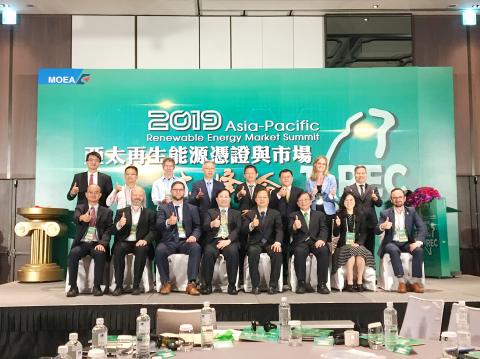The Ministry of Economic Affairs will improve the trade of renewable energy certificates by balancing supply and demand through reasonable pricing, and it plans to set up a trading platform by January next year, an official said yesterday.
The government has vowed to generate 20 percent of the nation’s electricity from renewable energy sources by 2025, when it also plans to phase out existing nuclear power generation facilities.
After amendments to the Renewable Energy Development Act (再生能源發展條例) were promulgated in May, big electricity users are required to ensure that certain ratios of their power supply come from renewable energy sources, Minister Without Portfolio Kung Ming-hsin (龔明鑫) told a forum on renewable energy in Taipei.

Photo: Lin Chia-nan, Taipei Times
Rising demand for renewable energy — either due to the act or corporate social responsibility — highlights the importance of renewable power certificates and their trading mechanism, he said, expressing the hope that the nation’s renewable energy trading market would become more active.
Sufficient supply of power from renewable energy sources, easy access and reasonable prices are key to boosting transactions in the renewable energy market, Vice Minister of Economic Affairs Lin Chuan-neng (林全能) said.
Having set clear goals in enhancing the ratio of renewable power sources, the bureau estimates that by next year, the installed capacity of renewable energy would reach 11.3 gigawatts, Lin said.
To facilitate renewable energy trade, the government established the National Renewable Energy Certification Center in April 2017, while the Bureau of Standards, Metrology and Inspection is planning to launch a certificate trading platform by Jan. 1 next year, he said.
As of yesterday, 59,973 certificates had been issued — 51,325 certificates for wind power, 8,560 for solar power and 88 for biomass power, but only 2,759 certificates have been sold, the center’s Web site showed.
Asked to comment on the wide gap between issued and sold certificates, Lin said that integration between the certificates and renewable power sources needs improvement.
The transactions would also be improved if there is a better pricing mechanism, he said, adding that the bureau and the center would further analyze the costs of different renewable energy sources.
Delivering a speech titled “Let the Sunshine In” at the forum, Google senior lead for energy and infrastructure Amanda Corio said that renewables have become more cost-effective and that energy storage projects are critically important to ensure stable power supply.
Taiwan still has higher costs of renewables than other places, she said, expressing the hope that the barrier would be removed.

SHIPS, TRAINS AND AUTOMOBILES: The ministry has announced changes to varied transportation industries taking effect soon, with a number of effects for passengers Beginning next month, the post office is canceling signature upon delivery and written inquiry services for international registered small packets in accordance with the new policy of the Universal Postal Union, the Ministry of Transportation and Communications said yesterday. The new policy does not apply to packets that are to be delivered to China, the ministry said. Senders of international registered small packets would receive a NT$10 rebate on postage if the packets are sent from Jan. 1 to March 31, it added. The ministry said that three other policies are also scheduled to take effect next month. International cruise ship operators

NUMBERS IMBALANCE: More than 4 million Taiwanese have visited China this year, while only about half a million Chinese have visited here Beijing has yet to respond to Taiwan’s requests for negotiation over matters related to the recovery of cross-strait tourism, the Tourism Administration said yesterday. Taiwan’s tourism authority issued the statement after Chinese-language daily the China Times reported yesterday that the government’s policy of banning group tours to China does not stop Taiwanese from visiting the country. As of October, more than 4.2 million had traveled to China this year, exceeding last year. Beijing estimated the number of Taiwanese tourists in China could reach 4.5 million this year. By contrast, only 500,000 Chinese tourists are expected in Taiwan, the report said. The report

The Forestry and Nature Conservation Agency yesterday launched a gift box to market honey “certified by a Formosan black bear” in appreciation of a beekeeper’s amicable interaction with a honey-thieving bear. Beekeeper Chih Ming-chen (池明鎮) in January inspected his bee farm in Hualien County’s Jhuosi Township (卓溪) and found that more than 20 beehives had been destroyed and many hives were eaten, with bear droppings and paw prints near the destroyed hives, the agency said. Chih returned to the farm to move the remaining beehives away that evening when he encountered a Formosan black bear only 20m away, the agency said. The bear

Chinese embassy staffers attempted to interrupt an award ceremony of an international tea competition in France when the organizer introduced Taiwan and displayed the Republic of China flag, a Taiwanese tea farmer said in an interview published today. Hsieh Chung-lin (謝忠霖), chief executive of Juxin Tea Factory from Taichung's Lishan (梨山) area, on Dec. 2 attended the Teas of the World International Contest held at the Peruvian embassy in Paris. Hsieh was awarded a special prize for his Huagang Snow Source Tea by the nonprofit Agency for the Valorization of Agricultural Products (AVPA). During the ceremony, two Chinese embassy staffers in attendance